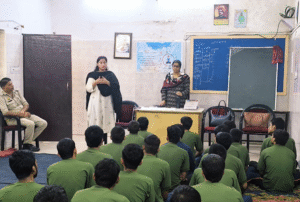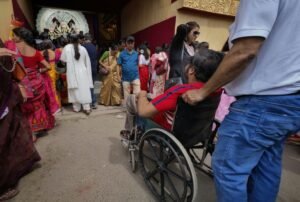
Back to Our Work
Towards Inclusive Policing: Disability Rights Training with J&K Police

Police personnel are often the first point of contact for persons with disabilities in situations of distress, conflict, or complaint. However, due to limited awareness and systemic barriers, these interactions are frequently marked by miscommunication, lack of access, and procedural lapses. To ensure that inclusion begins at the point of first response, iProbono India launched its Inclusive Policing Campaign in July last year. We followed this with a national stakeholder consultation, where a key requirement articulated was the need for training for police personnel. To address this gap, we conducted a series of police trainings, beginning with a one-day training program in Srinagar focused on Inclusive Policing for Persons with Disabilities. This was conducted in collaboration with the Zonal Police Headquarters (ZPHQ) Kashmir and the Office of the Chief Commissioner for Persons with Disabilities (CCPD).
At the Police Control Room in Srinagar, over 80 police officers from across Kashmir valley came together for this intensive, interactive learning experience.

Law, Empathy, and the Role of the First Responder
The training was designed to impart a foundational understanding of disability-inclusive policing, by equipping officers with legal knowledge as well as practical tools grounded in lived realities and rights-based frameworks. This included understanding disability rights, the legal duties of the police under the Rights of Persons with Disabilities Act, 2016 (RPwD Act), and the evolving legal landscape under the newly introduced Bhartiya Nagarik Suraksha Sanhita, 2023 (BNSS) and Bharatiya Nyaya Sanhita, 2023 (BNS).
Key speakers included:
- Iqbal Lone, State Commissioner for Persons with Disabilities, J&K
- Karuvaki Mohanty, Program Manager, iProbono India
- Shrutika Pandey, Program Officer, iProbono India
- Hasnain Khawja, Advocate, Supreme Court, High Court of Delhi & J&K
Each expert offered practical, on-ground insights into the implementation of legal safeguards and the need for attitudinal transformation. From visible to invisible disabilities, the officers were trained to recognise diverse accessibility needs and to respond with sensitivity and legal awareness.
“Reasonable accommodation for persons with disabilities in policing is not optional, but a binding legal obligation for inclusive justice,” says Mohanty. She emphasised the point raised by several speakers: that persons with disabilities are active participants in the justice system, whose rights must be upheld with full dignity and autonomy.
Understanding Legal Duties Under RPwD Act
Participants learned the duties of police officers under the RPwD Act, including:
- Making police stations accessible by using ramps, tactile paths and accessible toilets.
- Ensuring digital accessibility through accessible websites and complaint mechanisms, screen-reader compatibility and ISL (Indian Sign Language) videos.
- Using inclusive communication including ISL through Sign Language Interpreters, written notes, or simplified language when needed.
- Treating every individual with dignity and autonomy, and never assuming persons with disabilities to be incompetent.
A Step Towards Systemic Change
Participating officers left the training session with a deeper understanding of the law, and a renewed sense of responsibility. Representing the Inspector General of Police, Kashmir, Jaasir Ashraf Mir, Senior Prosecuting Officer and Legal Advisor at ZPHQ extended his heartfelt thanks to all participants and resource persons, acknowledging the urgent need for regular and widespread disability rights training within the police force.
This training was part of iProbono India’s broader commitment to enabling access to justice for all. Over the next months, we will be expanding the training programs to various states and ensure momentum to institutionalise inclusive policing practices across India.
Want to organise a training session for your police unit, institution, or department?
If you would like to partner with us on inclusive policing and disability rights training, or if you have any questions, please write to us communications@i-probono.com.











